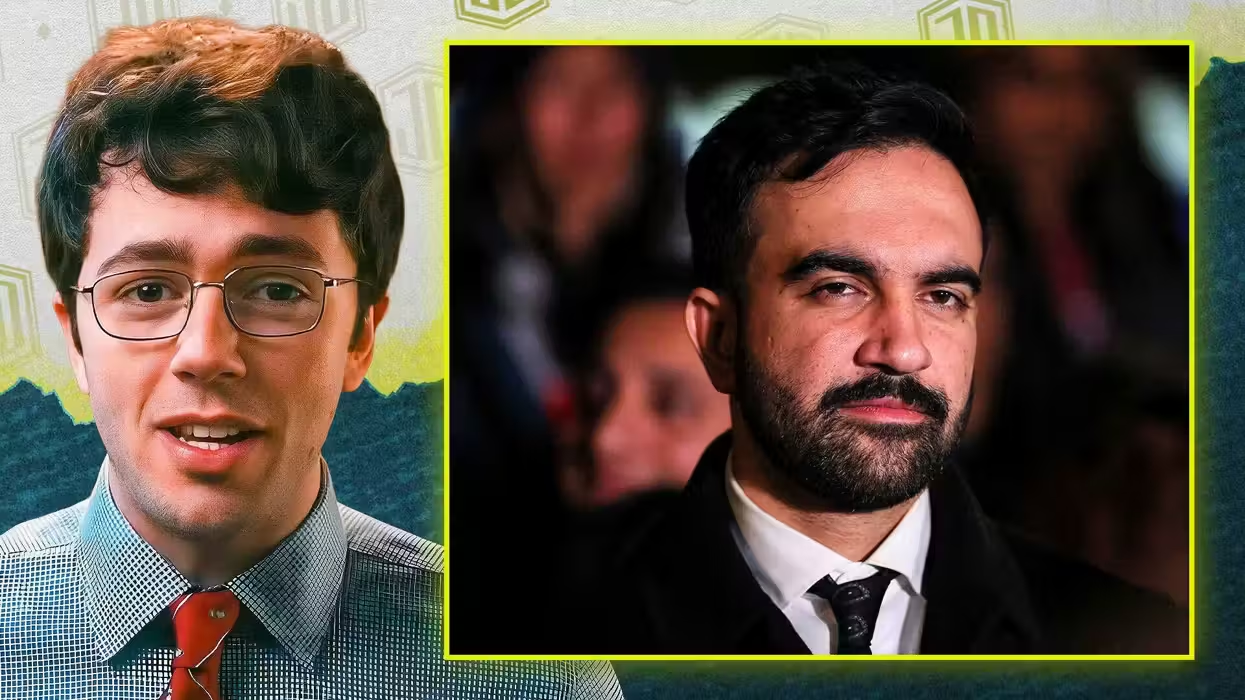Israeli lawmakers are slamming Secretary of State John Kerry for suggesting the Israeli-Palestinian conflict has contributed to the growth of the Islamic State group. A State Department spokeswoman, however, disputed the politicians’ understanding of Kerry’s words.
Naftali Bennett, Israel’s economy minister, suggested in a post on Facebook that Kerry was promoting anti-Semitic slander.
“Even when a British Muslim beheads a British Christian, there will always be those who blame the Jews,” Bennett wrote.
The controversy was sparked Thursday when Kerry spoke at a ceremony at the State Department in honor of the Muslim holiday of Eid al-Adha during which he referenced the reasons behind the recruitment of Muslim youths to the rebel group aiming to depose the Syrian and Iraqi governments and establish a caliphate.
 U.S. Secretary of State John Kerry speaks at a reception for the Muslim feast of Eid al-Adha at the State Department in Washington on October 16, 2014. Eid al-Adha, also known as the Festival of Sacrifice, celebrates the end of the Hajj pilgrimage, which nearly two million Muslims from across the globe perform each year. It is also a time when Muslims commemorate Abraham's readiness to sacrifice his son by distributing food and basic needs to those less fortunate. (Photo: Nicholas Kamm/AFP/Getty Images)
U.S. Secretary of State John Kerry speaks at a reception for the Muslim feast of Eid al-Adha at the State Department in Washington on October 16, 2014. Eid al-Adha, also known as the Festival of Sacrifice, celebrates the end of the Hajj pilgrimage, which nearly two million Muslims from across the globe perform each year. It is also a time when Muslims commemorate Abraham's readiness to sacrifice his son by distributing food and basic needs to those less fortunate. (Photo: Nicholas Kamm/AFP/Getty Images)
“As I went around and met with people in the course of our discussions about the ISIL [Islamic State] coalition, the truth is we – there wasn’t a leader I met with in the region who didn’t raise with me spontaneously the need to try to get peace between Israel and the Palestinians, because it was a cause of recruitment and of street anger and agitation that they felt – and I see a lot of heads nodding – they had to respond to,” Kerry said. “And people need to understand the connection of that. And it has something to do with humiliation and denial and absence of dignity, and Eid [the holiday] celebrates the opposite of all of that.”
Member of Israeli Knesset Ayelet Shaked of the right-wing Jewish Home party told Israel’s Army Radio Sunday morning, “To tie the Islamic State with the Israeli-Palestinian conflict is something that shows a lack of understanding about what’s happening in the Middle East. It not right that every conflict and every bloodshed should be tied to the State of Israel.”
Shaked added, “I watched Kerry’s segment almost six times yesterday. Unfortunately, he said it."
State Department spokeswoman Marie Harf insisted on Friday that Kerry did not link the Islamic State’s growth to the Israeli-Palestinian issue and accused Bennett, without citing his name, of distorting Kerry’s quote for political gain.
“[H]e did not make any linkage between Israel and the growth of ISIL, period. And we can go back over what he actually said, which I have in front of me. He did not make that linkage,” Harf said. “What he was saying is in the course of his work, do leaders in Europe and in the Middle East tell him that they like that the U.S. wants to try to achieve peace? Of course they do. Do the leaders think peace would help create a more stable region? Of course they do.”
She continued, “[E]ither this specific [Israeli] minister did not actually read what the Secretary said, or someone is engaging in the politics of distortion here. By any means it is an inaccurate reading of what the Secretary said. He did not make a linkage between Israel and the growth of ISIL, period.”
Following Harf’s defense of Kerry, Bennett dug in, taking to Facebook again Saturday night and writing, “I will not be silent. The notion regarding the centrality of the Israeli-Palestinian conflict is not true and puts Israel at risk.”
“There is a widespread notion around the world, shared even by some in Israel, that the Israeli-Arab conflict is at the center of the Middle East’s problems," Bennett wrote. "The theory goes something like this: The Israeli ‘occupation’ in Judea & Samaria creates frustration within Arab-Muslim states, and this frustration produces problems for the region.”
He railed against the explanation.
“According to the extreme version of this misconception, Israel is actually the source of the Middle East’s problems because it humiliates people and causes suffering and fuels the flames of a majority of the Middle East’s conflicts and bloodshed,” the Israeli minister wrote. “Based on this analysis, the moment Israel surrenders Samaria, Judea and half of Jerusalem to the Palestinians, the main source of the region’s problems will disappear and the Middle East will stabilize.”
Bennett claimed, “This is baseless,” adding:
The 9/11 attacks had nothing to do with Israel.
Global Jihad has nothing to do with Israel.
Al-Sisi’s revolution in Egypt had nothing to do with Israel.
The disintegration of Iraq has nothing to do with Israel.
The massacre of at least 150,000 people, including women and children, by Assad in Syria has nothing to do with Israel.
The creation of ISIS had nothing to do with Israel.
ISIS’s military gains in Iraq and Syria have nothing to do with Israel.
The intense hatred between Sunni & Shiite Muslims has nothing to do with Israel.
**
This concept is not just wrong, it is dangerous for the State of Israel.
If Israel is the source of the region’s troubles, then we might as well get rid of Israel. Who needs the headache?
If it is Israel’s fault that British and Americans are being beheaded, then the conclusion should be that we should sacrifice Israel for the sake of world peace.
**
But here is the truth: Radical Islam is trying to create Caliphates – an Islamic Kingdom - throughout the entire Middle East.
That is their goal. They have been declaring this for years.
Hamas says the same. So does Hezbollah in Lebanon. Al-Qaida as well.
Now ISIS, the new Sunni group in the neighborhood, has joined the club.
This is the true story.
Bennett proceeded to question Kerry’s resolve against terrorism, without mentioning the secretary of state:
To face this evil we need to be strong.
We don’t need to try and "understand" their distress; rather, we must fight them until they are eliminated. […]
We are on the frontlines of the free world standing against a wave of terror.
We should be supported, and the world should have our backs.
We should not be the scapegoat for the Middle East’s problems.
“We must not be silent,” Bennett wrote. “When Israel is portrayed as the source of the region’s problems we need to immediately and forcefully dismiss this dangerous theory. Even when we are speaking to the United States - our best friend and strongest ally - we need to tell the truth.”
Earlier, Communications Minister Gilad Erdan of Prime Minister Benjamin Netanyahu’s Likud party wrote on Facebook, “I actually respect Kerry and his efforts, but every time he breaks new records of showing a lack of understanding of our region and the essence of the conflict in the Middle East I have trouble respecting what he says.”
Foreign Minister Avigdor Liberman criticized the ministers for publicly berating Kerry, telling Israel’s Channel 2 News, “I think there’s no alternative for us to the United States, and such incitement only hurts [us].”
“There can be differences of opinion between friends, but there needn’t be attacks,” Liberman said according to the Times of Israel.
—

 U.S. Secretary of State John Kerry speaks at a reception for the Muslim feast of Eid al-Adha at the State Department in Washington on October 16, 2014. Eid al-Adha, also known as the Festival of Sacrifice, celebrates the end of the Hajj pilgrimage, which nearly two million Muslims from across the globe perform each year. It is also a time when Muslims commemorate Abraham's readiness to sacrifice his son by distributing food and basic needs to those less fortunate. (Photo: Nicholas Kamm/AFP/Getty Images)
U.S. Secretary of State John Kerry speaks at a reception for the Muslim feast of Eid al-Adha at the State Department in Washington on October 16, 2014. Eid al-Adha, also known as the Festival of Sacrifice, celebrates the end of the Hajj pilgrimage, which nearly two million Muslims from across the globe perform each year. It is also a time when Muslims commemorate Abraham's readiness to sacrifice his son by distributing food and basic needs to those less fortunate. (Photo: Nicholas Kamm/AFP/Getty Images)






